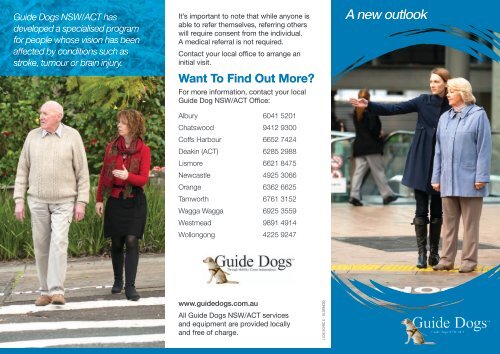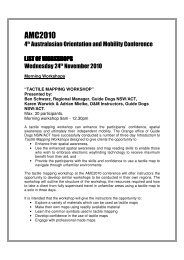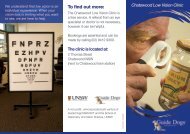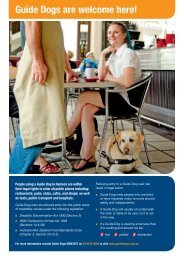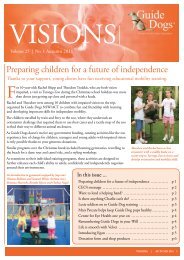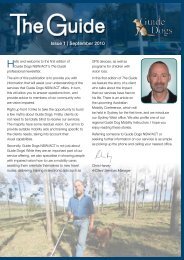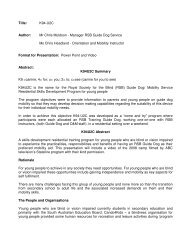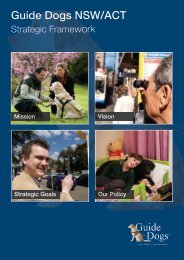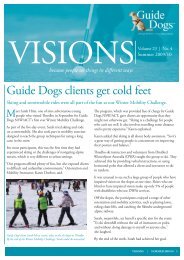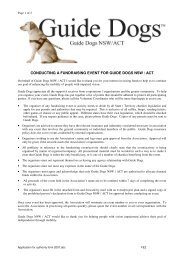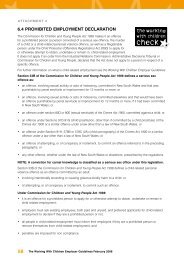Through A New Outlook - Guide Dogs NSW/ACT
Through A New Outlook - Guide Dogs NSW/ACT
Through A New Outlook - Guide Dogs NSW/ACT
You also want an ePaper? Increase the reach of your titles
YUMPU automatically turns print PDFs into web optimized ePapers that Google loves.
<strong>Guide</strong> <strong>Dogs</strong> <strong>NSW</strong>/<strong>ACT</strong> has<br />
developed a specialised program<br />
for people whose vision has been<br />
affected by conditions such as<br />
stroke, tumour or brain injury.<br />
It’s important to note that while anyone is<br />
able to refer themselves, referring others<br />
will require consent from the individual.<br />
A medical referral is not required.<br />
Contact your local office to arrange an<br />
initial visit.<br />
Want To Find Out More?<br />
For more information, contact your local<br />
<strong>Guide</strong> Dog <strong>NSW</strong>/<strong>ACT</strong> Office:<br />
Albury 6041 5201<br />
Chatswood 9412 9300<br />
Coffs Harbour 6652 7424<br />
Deakin (<strong>ACT</strong>) 6285 2988<br />
Lismore 6621 8475<br />
<strong>New</strong>castle 4925 3066<br />
Orange 6362 6625<br />
Tamworth 6761 3152<br />
Wagga Wagga 6925 3559<br />
Westmead 9891 4914<br />
Wollongong 4225 9247<br />
A new outlook<br />
www.guidedogs.com.au<br />
All <strong>Guide</strong> <strong>Dogs</strong> <strong>NSW</strong>/<strong>ACT</strong> services<br />
and equipment are provided locally<br />
and free of charge.<br />
GDN0010 - 2 28/07/2011
Training ranges from walking<br />
safely around the home through<br />
to using public transport<br />
and travelling in a busy city<br />
environment. Support is provided<br />
until the person feels confident.<br />
Many people who have vision impairment as<br />
a result of a brain injury find their eyes may<br />
still function well but the messages being<br />
transmitted to the brain can be misinterpreted.<br />
One of the most common forms of<br />
neurological vision impairment is<br />
Homonymous Hemianopia. Surprisingly,<br />
those affected often may not realise their sight<br />
is compromised.<br />
Warning signs can include:<br />
• Being confused and easily disorientated,<br />
even in familiar places.<br />
• Having difficulties when reading.<br />
• Being overwhelmed or anxious in crowded<br />
or busy places or bumping into people<br />
or things.<br />
• Crossing roads unsafely.<br />
• Lacking confidence when using<br />
public transport.<br />
• Experiencing double or blurry vision.<br />
How can we help?<br />
While individual requirements may vary, our<br />
programs teach people how to compensate<br />
for their vision loss and restore their confidence.<br />
Part of this training includes scanning strategies<br />
or, if required, a mobility aid.<br />
Things you should know:<br />
• Training programs are designed according<br />
to individual needs.<br />
• Early referral is recommended to help<br />
develop safe and consistent scanning.<br />
• Education, support and training are provided<br />
for the person, family and carers regarding<br />
the nature of this type of vision loss.<br />
• We will visit the person wherever they are.<br />
This may be in a rehabilitation ward or<br />
at home.<br />
• Training ranges from walking safely<br />
around the home through to using<br />
public transport and travelling in a busy<br />
city environment.<br />
• Support is provided until the person<br />
feels confident.<br />
• Follow-up visits are offered to ensure<br />
compensatory scanning strategies are<br />
effective and safe.<br />
• We work with other rehabilitation<br />
professionals particularly when cognitive,<br />
physical and/or behavioural challenges<br />
are present.


